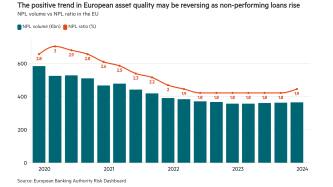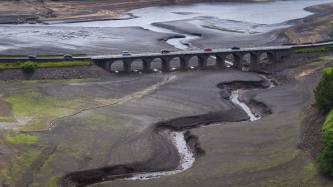Turkey is due to hold general elections on July 22, four months ahead of schedule, in the hope of ending a political crisis over who should be the next president of the republic. The crisis threatens to derail the country’s fast growing economy and cause deep divisions among its citizens along religious and secular lines. This comes at a time when five years of robust economic growth is slowing and concern over Turkey’s ballooning current account deficit is increasing.
“Turkey enjoyed high growth rates over the past five years and it appears that growth figures will continue to be in the positive territory for a while, although the economy has started to cool off,” Özgür Altug, chief economist at Raymond James Securities – Turkey, wrote in a report on the country’s economy in April.
He added: “Economic activity will [continue slowing] in the first quarter of 2007, mostly due to meagre consumption growth on the back of higher interest rates. However, recovering export performance has so far kept the economy away from a hard landing, and limited the impact of shrinking consumption and a production slump in the domestic market.”
Spending on household appliances in Turkey dropped 8.3% in the third quarter and 6.3% in the fourth quarter of 2006, according to the Turkish Statistical Institute (Turkstat). Domestic motor vehicle sales slumped 29.8% in March 2007 for the 10th consecutive month, the Automotive Manufacturers Association said.
Interest rates on consumer loans increased sharply in May 2006 following fluctuations in global currency markets. Interest rates have yet to return to pre-crisis levels.
But Turkey’s economy continues to flourish, fuelled by exports, an influx of foreign investment and privatisation revenues, as well as global capital inflows.
Manufacturers of durable consumer goods and motor vehicles – automobiles, commercial vehicles and agricultural tractors – are turning to exports to increase production and avert a recession. In the first three months of this year, Turkey’s exports reached $23bn, up 25.1% from 2006, the Turkish Exporters Assembly (TIM) reported. TIM said Turkey’s exports could top $100bn this year, up from $85.9bn in 2006. Imports totalled $136.3bn in 2006.
Automotive industry exports, including passenger cars, commercial vehicles, agricultural tractors and automotive parts and components, have been the driving force of Turkey’s exports in the first quarter of 2007.
Foreign investment
Turkey attracted $11.1bn in foreign direct investment (FDI) in the first quarter of 2007, the finance ministry said, and could reach $30bn for the year. This would make Turkey one of the world’s leading FDI recipients. In 2006, the country ranked ninth in the world, drawing a record $17.8bn, according to the United Nations Conference on Trade and Development’s World Investment Report 2006.
Banking, insurance and services, such as logistics, have been major recipients of FDI this year. Another area in which foreigners are investing is property, including housing complexes, office buildings and shopping malls.
“Anyone [with] $150m in his pocket is rushing to Turkey to invest in real estate. Returns on the Turkish property market are higher than in the EU,” Hakan Ates, CEO of Denizbank, a commercial bank, said in an interview with the newspaper Sabah.
The government is continuing its privatisation programme. Several major state companies are slated for sale this year, including petrochemical concern Petkim and the cigarette factories of former tobacco monopoly Tekel.
In May, the Privatisation Administration, the main agency carrying out Turkey’s ambitious sell-off programme, raised $1.8bn in a public offering for its 24.98% stake in Halkbank, Turkey’s second biggest state bank, in the country’s biggest ever initial public offering (IPO). It brought privatisation revenues this year to $1.87bn.
Asset sales
Contracts for projects tendered in 2004, 2005 and 2006 worth at least $3.4bn are still waiting to be finalised this year. Many of them have been entangled in legal cases. Others are awaiting approval from competition authorities and the Council of State. Prospective asset sales that are near conclusion include:
- A consortium composed of Turkey’s Global Investment Holding, Hong Kong’s Hutchison Port Holdings and the Aegean Exporters Association won a $1.28bn tender in May to operate the Port of Izmir, Turkey’s second biggest maritime gateway, for 49 years.
- Turkey’s Zorlu Holding placed the highest bid for 96,505 square metres of prime property owned by the State Highways Department in Istanbul’s busy Zincirlikuyu district, with a $800m offer on March 7.
- Sama Dubai was the highest bidder for 46,000 square metres of prime property owned by the Istanbul Municipality in Istanbul’s Levent district, offering $705m in May. Owned by the Emir of Dubai, Sama Dubai plans to build Europe’s two highest buildings, the twin drill bits-shaped Dubai Towers, at the site, which is currently the garage terminal of the Istanbul Municipal Bus Company.
- PSA-Akfen Consortium is waiting for approval of its right to rent the State Railways Administration’s (TCDD’s) Port of Mersin, on the Mediterranean coast, for $755m.
- The Akfen-Dogus-TuvSud Consortium is awaiting approval from the authorities to buy the Motor Vehicle Inspection Centres of Turkey for $615.5m. The centres – a series of fixed facilities along roads in 71 provinces and 13 counties, and mobile sites in 10 provinces and 578 counties – inspect mainly commercial vehicles, including international transport lorries, for safety measures and help to reduce accidents on the highways. They also provide spare parts.
Turkey’s economic successes have come at huge costs: the country ran a massive $50.5bn trade deficit and a $31.3bn current account deficit in 2006 because of a strong lira. The government is financing the deficits with FDI and short-term capital entries into Turkish stocks and bonds – a situation that most economists say is unsustainable. The bubble, they say, will one day burst and hurt the entire country.
Economic ‘time bomb’
“The real risk is the economy itself,” Taner Berksoy, a noted professor of economics and dean of the school of economics and administrative sciences at Istanbul’s Bahçesehir University, told trade magazine Hedef. “We are presently sitting on a time bomb – Turkey has a current account deficit of over $30bn. Even a slowdown in foreign capital entries into the country will cause unease.”
A Yavuz Ege, a member of the board of directors of Isbank, Turkey’s biggest bank, says: “It is widely believed that 2007 will be a difficult year across the globe. Economies that don’t have their feet firmly on the ground will be the most adversely affected. Turkey will be one of those countries that will be affected unfavourably. We have nothing to do at present except pray to Allah to protect the nation.”
Oguz Oyan, a deputy with the opposition Republican People’s Party (CHP) and a professor of economics, warns that Turkish manufacturers are buying raw materials and semi-finished goods for assembly in their factories instead of acquiring them in Turkey. “The rise in imports is hurting Turkish companies that produce raw materials and semi-finished goods for industry, forcing many to go out of business,” he says.
“With a strong currency and excessive imports, we are creating employment in other countries. But when it comes to creating jobs in Turkey, we are impoverishing our countrymen,” says Mr Oyan.
POLITICAL CONFRONTATION
Political crisis erupted in Turkey when, on April 24, the ruling conservative Justice and Development Party (AKP) named Islamist deputy prime minister and foreign minister Abdullah Gül, as its candidate to succeed outgoing president Ahmet Necdet Sezer. The announcement sparked massive anti-government demonstrations across the country by nationalists and secularists, and threats by the armed forces to topple the administration.
The protesters, citing the head scarves worn by Mr Gül’s wife as a symbol of radical Islam, claimed the AKP was attempting to subvert Turkey’s secular order, established by Kemal Ataturk (1881-1938), the revered founder and first president of the Turkish republic. They said the AKP was aiming to set up a state based on sharia (Islamic) law.
Opposition parties boycotted the vote in the Grand National Assembly and Turkey’s Constitutional Court cancelled the election of Mr Gül, saying that the assembly lacked a 367-seat quorum to carry out the selection, forcing the government to call snap general elections. Mr Gül eventually stepped down as a candidate.
Prime minister Recep Tayyip Erdogan accused the main opposition leader, Deniz Baykal, of “firing a bullet at Turkey’s democracy” by getting the Constitutional Court to prevent the government from electing a president, and for staging the mass protests across Turkey against the AKP.











